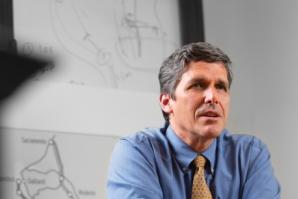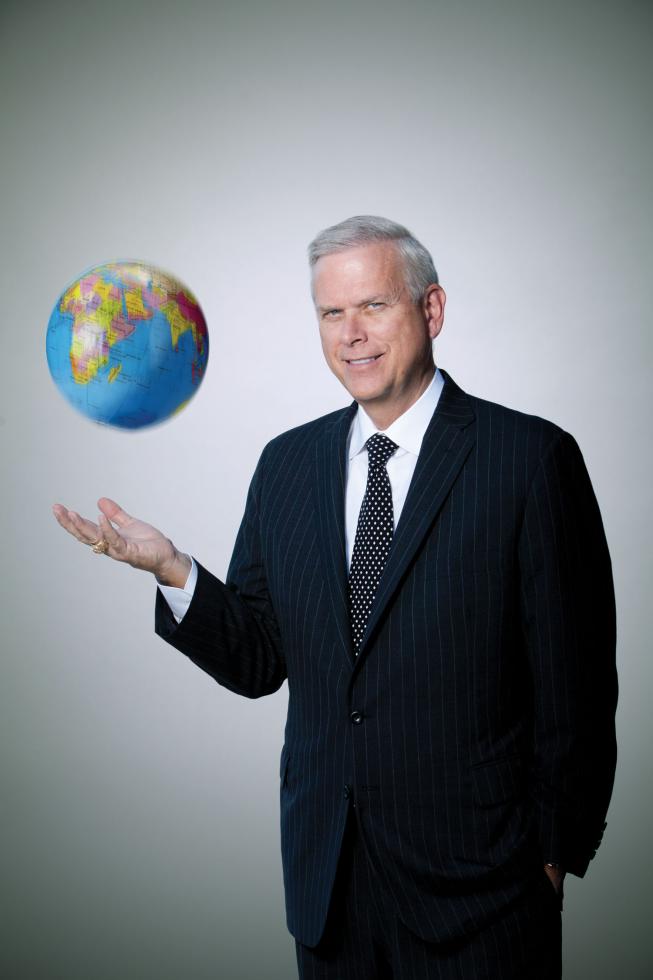Husband-and-wife team Alex and Feysan Lodde launched MediVan in 1975 with one bus, three employees and a truckload of dedication. Now called MV Transportation Inc., the privately owned passenger transportation company is the largest of its kind in the United States.
In the past decade, the Fairfield-based dynamo has ballooned from a regional transportation venture with 59 contracts and revenues of $100 million to an international company servicing 229 contracts and earning more than $770 million. The Lodde’s are still hands-on with the company but have transferred the daily running of the business to a top-notch management team.
In the past few years, Chairman of the Board Jon Monson has been eyeing opportunities to carry MV Transportation’s passenger buses and shuttles worldwide and reach annual revenues exceeding $1 billion. To take this leap, the board of directors launched a two-year search for a CEO with the business and financial chops to negotiate and acquire government transportation contracts around the globe. Carter Pate took the helm in August.
“We have the opportunity now to continue growing the company in our primary market and explore new opportunities as they develop with fiscally constrained governments,” Monson says.
As former global and U.S. managing partner for capital products and infrastructure at PricewaterhouseCoopers, Pate, also co-leader of global government practice there, built that company’s government contracting business, propelling profits from zero to $150 million in five years. Pate also boosted MV Transportation’s earnings more than $75 million in his first week by acquiring USA United Fleet Inc., a school bus operator in New York, N.Y. MV began operating 600 vehicles to service 500-plus school bus routes throughout New York City in September.
And Pate just signed the company’s first contract in Saudi Arabia. He also has trips planned for China and other countries in the Middle East.
“We clearly want to have one of the fastest growth rates in the transportation industry,” Pate says. “I’d like to think we can keep our earnings at the same 14 percent compounded interest rate as we have in the past five years, and that puts us in a very unique league of our own with that growth rate.”
Achieving that kind of success requires foresight and strategic planning. The Loddes recognized in the 1990s that they needed to recruit an expert management team for MV to compete with the publicly held transportation giants dominating the field at that time.
The industry is transforming once again as cities, counties and transportation authorities slash budgets and offer fewer bus and shuttle options, creating fierce competition between contracting companies. In response, MV has worked with its customers to lower costs while optimizing service. Though cutting costs and trips is today’s reality, 10 years ago, MV’s clients were focused on better serving communities and expanding public transportation.
“It’s a new environment, and I think we understand that environment better than our competitors,” Monson says. “We go into a community and try to understand what the objectives are and design a customized solution to fulfill the particular needs.”
Monson credits MV’s success in part to its innovative in-house IT team that develops customized technology. Transportation companies purchase multimillion-dollar systems to enable passengers to locate bus routes and schedules via the Internet or cell phone, and then pass the technology cost to customers. MV has created the same thing for its clientele using cell phone technology at a tenth of the price.
Passengers waiting for MV operated city and school buses or shuttles at airports, hotels, universities and corporate campuses can check when the next bus will arrive. The firm has produced a system in which riders are alerted by cell phone just before a bus pulls up, minimizing waits in stormy weather.
As a privately held business, MV prides itself on maintaining its founders’ goal to place customer service before profits.
“A number of our passengers are people with disabilities, and we need to understand that we are first and foremost community servants before business people,” Monson says. “Without us in the community, many of these people would have a difficult time performing the very basic functions in life.”
Pate plans to conduct pulse surveys and use other technology to measure client satisfaction. And passenger safety is the first topic of discussion at every meeting. The key to ensuring customers are well treated, though, is keeping employees happy, Pate says.
“Making sure employees feel good and love what they do is important in keeping morale high and in them making an effort to see that passengers are secure,” Pate says. “All of that requires constant vigilance from employees who are proud and take their work to heart.”
Recommended For You

Streetcar Named Desire
Funding questions loom over downtown streetcar project
For nearly two decades, local city officials have envisioned a streetcar that would transport residents and visitors across downtown Sacramento.

The Conductor
The California High-Speed Rail Authority replaced an engineer with a political operative to lead the nation’s biggest public works project. Jeff Morales instantly charmed his opponents but made technical decisions that placed high-speed rail at the mercy of the courts. Can Morales save his runaway train?



